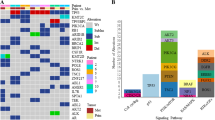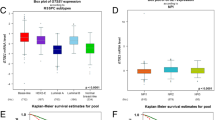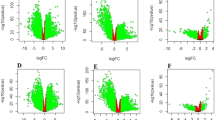Abstract
Background
Present study was aimed to investigate the relationship of p53 mutation status with response to docetaxel in breast cancers. In addition, attempts were made to identify the genes differentially expressed between p53-wild and p53-mutated breast tumors and to study their relationship with response to docetaxel.
Methods
Mutational analysis of p53 was done in 50 breast tumor samples obtained from primary breast cancer patients (n = 33) and locally recurrent breast cancer patients (n = 17) before docetaxel therapy. Response to docetaxel was evaluated clinically. Gene expression profiling (n = 2,412) was conducted by adapter-tagged competitive-PCR in 186 tumor samples, which were also analyzed in their p53 mutational status in order to identify the differentially expressed genes according to p53 mutation status and their relationship with response to docetaxel.
Results
Response rate of p53-mutated tumors (44%) was lower than that of p53-wild tumors (62%) though there was no statistical significance (P = 0.23). Of 2412 genes, mRNA expression of 13 genes was significantly different between p53-wild and p53-mutated tumors. Of these 13 genes, mRNA expression of CCT5, RGS3,␣and YKT6 was significantly up-regulated in p53-mutated tumors and associated with a low response rate to docetaxel. Treatment of MCF-7 cells with siRNA specific for CCT5, RGS3, or YKT6 resulted in a significant enhancement of docetaxel-induced apoptosis.
Conclusions
CCT5, RGS3, and YKT6 mRNA expressions, which are up-regulated in p53-mutated breast tumors, might be implicated in resistance to docetaxel and clinically useful in identifying the subset of breast cancer patients who may or may not benefit from docetaxel treatment.
Similar content being viewed by others

Abbreviations
- ER:
-
Estrogen receptor
- RGS3:
-
Regulator of G-protein signaling 3
- CCT5:
-
Chaperonin containing TCP1 Subunit 5 (epsilon)
- YKT6:
-
Soluble N-ethylmaleimide-sensitive-factor attachment protein receptor (SNARE) protein Ykt6
- siRNA:
-
Small interfering RNA
- DHPLC:
-
Denaturing high performance liquid chromatography
- ATAC-PCR:
-
Adapter-tagged competitive polymerase chain reaction
References
Piccart MJ, de Valeriola D, Dal Lago L et al (2005) Adjuvant chemotherapy in 2005: standards and beyond. Breast 14:439–445
Hudis C (2005) The best use of adjuvant chemotherapy: new drugs and new use of “old” drugs. Breast 14:570–575
Charfare H, Limongelli S, Purushotham AD (2005) Neoadjuvant chemotherapy in breast cancer. Br J Surg 92:14–23
Trudeau M, Sinclair SE, Clemons M, Breast Cancer Disease Site Group (2005) Neoadjuvant taxanes in the treatment of non-metastatic breast cancer: a systematic review. Cancer Treat Rev 31:283–302
O’Shaughnessy J (2005) Extending survival with chemotherapy in metastatic breast cancer. Oncologist 10(Suppl 3): 20–29
Mauriac L, Debled M, MacGrogan G (2005) When will more useful predictive factors be ready for use? Breast 14:617–623
Sjostrom J, Blomqvist C, Heikkila P et al (2000) Predictive value of p53, mdm-2, p21, and mib-1 for chemotherapy response in advanced breast cancer. Clin Cancer Res 6:3103–3110
Palmeri S, Vaglica M, Spada S et al (2005) Weekly docetaxel and gemcitabine as first-line treatment for metastatic breast cancer: results of a multicenter phase II study. Oncology 68(4–6):438–445
Figgitt DP, Wiseman LR (2000) Docetaxel: an update of its use in advanced breast cancer. Drugs 59:621–651
Sjostrom J, Blomqvist C, von Boguslawski K et al (2002) The predictive value of bcl-2, bax, bcl-xL, bag-1, fas, and fasL for chemotherapy response in advanced breast cancer. Clin Cancer Res 8:811–816
Buchholz TA, Davis DW, McConkey DJ et al (2003) Chemotherapy-induced apoptosis and Bcl-2 levels correlate with breast cancer response to chemotherapy. Cancer J 9:33–41
Miyoshi Y, Taguchi T, Kim SJ et al (2005) Prediction of response to docetaxel by immunohistochemical analysis of CYP3A4 expression in human breast cancers. Breast Cancer 12:11–15
Shalli K, Brown I, Heys SD, Schofield AC (2005) Alterations of beta-tubulin isotypes in breast cancer cells resistant to docetaxel. FASEB J 19:1299–1301
Egawa C, Miyoshi Y, Takamura Y et al (2001) Decreased expression of BRCA2 mRNA predicts favorable response to docetaxel in breast cancer. Int J Cancer 95:255–259
Im SA, Kim SB, Lee MH et al (2005) Docetaxel plus epirubicin as first-line chemotherapy in MBC (KCSG 01-10-05): phase II trial and the predictive values of circulating HER2 extracellular domain and vascular endothelial growth factor. Oncol Rep 14:481–487
Rouzier R, Rajan R, Wagner P et al (2005) Microtubule-associated protein tau: a marker of paclitaxel sensitivity in breast cancer. Proc Natl Acad Sci USA 102:8315–8320
Chang JC, Wooten EC, Tsimelzon A et al (2005) Patterns of resistance and incomplete response to docetaxel by gene expression profiling in breast cancer patients. J Clin Oncol 23:1169–1177
Iwao-Koizumi K, Matoba R, Ueno N et al (2005) Prediction of docetaxel response in human breast cancer by gene expression profiling. J Clin Oncol 23:422–431
Learn PA, Yeh IT, McNutt M et al (2005) HER-2/neu expression as a predictor of response to neoadjuvant docetaxel in patients with operable breast carcinoma. Cancer 103:2252–2260
Bergh J, Norberg T, Sjogren S, Lindgren A, Holmberg L (1995) Complete sequencing of the p53 gene provides prognostic information in breast cancer patients, particularly in relation to adjuvant systemic therapy and radiotherapy. Nat Med 1:1029–1034
Aas T, Borresen AL, Geisler S et al (1996) Specific P53 mutations are associated with de novo resistance to doxorubicin in breast cancer patients. Nat Med 2:811–814
Wurzburger RJ, Gupta R, Parnassa AP et al (2003) Use of GC clamps in DHPLC mutation scanning. Clin Med Res 1:111–118
Zhang L, Jia G, Li WM, Guo RF, Cui JT, Yang L, Lu YY (2004) Alteration of the ATM gene occurs in gastric cancer cell lines and primary tumors associated with cellular response to DNA damage. Mutat Res 557:41–51
Saito S, Matoba R, Kato K (2003) Adapter-tagged competitive PCR (ATAC-PCR) – a high-throughput quantitative PCR method for microarray validation. Methods 31:326–331
Elbashir SM, Harborth J, Weber K, Tuschl T et al (2002) Analysis of gene function in somatic mammalian cells using small interfering RNAs. Methods 26:199–213
Andersson J, Larsson L, Klaar S et al (2005) Worse survival for TP53 (p53)-mutated breast cancer patients receiving adjuvant CMF. Ann Oncol 16:743–748
Soussi T, Beroud C (2001) Assessing TP53 status in human tumours to evaluate clinical outcome. Nat Rev Cancer 1:233–240
Iwao K, Matoba R, Ueno N et al (2002) Molecular classification of primary breast tumors possessing distinct prognostic properties. Hum Mol Genet 11:199–206
Taniguchi K, Takano T, Miyauchi A et al (2005) Differentiation of follicular thyroid adenoma from carcinoma by means of gene expression profiling with adapter-tagged competitive polymerase chain reaction. Oncology 69:428– 435
Kurokawa Y, Matoba R, Nakamori S et al (2004) PCR-array gene expression profiling of hepatocellular carcinoma. J Exp Clin Cancer Res 23:135–141
Motoori M, Takemasa I, Yano M et al (2005) Prediction of recurrence in advanced gastric cancer patients after curative resection by gene expression profiling. Int J Cancer 114:963–968
Casalou C, Cyrne L, Rosa MR, Soares H (2001) Microtubule cytoskeleton perturbation induced by taxol and colchicine affects chaperonin containing TCP-1 (CCT) subunit gene expression in Tetrahymena cells. Biochim Biophys Acta 1522:9–21
Ludwig A, Dietel M, Lage H (2002) Identification of differentially expressed genes in classical and atypical multidrug-resistant gastric carcinoma cells. Anticancer Res 22:3213–3221
Bowman EP, Campbell JJ, Druey KM, Scheschonka A, Kehrl JH, Butcher EC (1998) Regulation of chemotactic and proadhesive responses to chemoattractant receptors by RGS (regulator of G-protein signaling) family members. J Biol Chem 273:28040–28048
Tatenhorst L, Senner V, Puttmann S, Paulus W (2004) Regulators of G-protein signaling 3 and 4 (RGS3, RGS4) are associated with glioma cell motility. J Neuropathol Exp Neurol 63:210–222
Ikeda M, Hirokawa M, Satani N (2001) Molecular cloning and characterization of a steroid receptor-binding regulator of G-protein signaling protein cDNA. Gene 273:207–214
Kluger HM, Kluger Y, Gilmore-Hebert M et al (2004) cDNA microarray analysis of invasive and tumorigenic phenotypes in a breast cancer model. Lab Invest 84:320–331
Acknowledgments
This work was supposed in part by a Grant-in-aid for Scientific Research on priority Areas (No. 12217075) from the Ministry of Education, Culture, Sports, Science and Technology of Japan.
Author information
Authors and Affiliations
Corresponding author
Rights and permissions
About this article
Cite this article
Ooe, A., Kato, K. & Noguchi, S. Possible involvement of CCT5, RGS3, and YKT6 genes up-regulated in p53-mutated tumors in resistance to docetaxel in human breast cancers. Breast Cancer Res Treat 101, 305–315 (2007). https://doi.org/10.1007/s10549-006-9293-x
Received:
Accepted:
Published:
Issue Date:
DOI: https://doi.org/10.1007/s10549-006-9293-x



